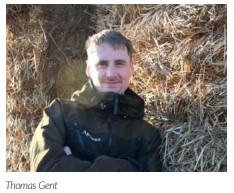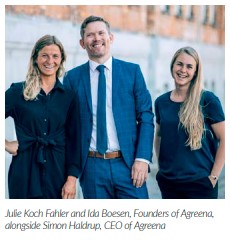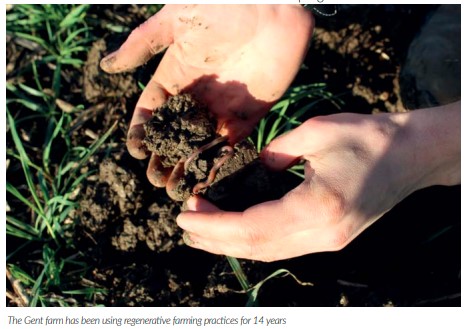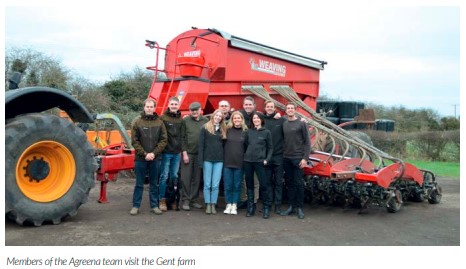This is the most exciting time to be a farmer!
I am Thomas Gent, 24 years old, and I live on my family arable farm on the LincolnshireC a m b r i d g e s h i r e border. My grandad Tony Gent and my dad Edward Gent made the transition to using more regenerative farming techniques around 14 years ago.

During the first COVID lockdown, I started to look into the opportunities to differentiate and diversify my farm and the food we produce. After researching different opportunities and areas for innovation, I became aware of soil carbon and the amazing ability of the dirt under our feet to draw down carbon from the atmosphere. So I set myself an exciting challenge: to monetise the carbon impact of my farm. Little did I know, this challenge would lead me to speaking at FTSE 100 board meetings, working with academics, advising investors and featuring on prime time TV.

Combating climate change is the greatest challenge of our generation. As caretakers of the land, we as farmers have such a unique opportunity to become climate heroes, showcasing to the world the importance of healthy, local food sources. I founded a brand called Gentle Farming to explore these opportunities. After working for over six months on different ideas and solutions to monetise my farm’s carbon negative position, a number of factors became evident. I’d need to achieve high quality, internationally recognised verification and certification if I wanted to appeal to larger corporate buyers. At the same time, I’d need a system that was simple and easy to use in our day to day workings. Most importantly, it would have to put the farmer first. I wanted full control of my impact and the farming practices implemented.

There was no doubt that I’d set myself a difficult task, but after a significant amount of trialling, testing and researching multiple carbon certificate systems, things started to look up when I came across Agreena. I connected with Ida Boesen, one of the founders of Agreena, in February 2021. Ida and her team were developing and launching their carbon system and looking for farms across Europe to pilot the programme. From our first few conversations, it was clear that we had a shared ethos and joint mission; to drive financial and environmental sustainability in agriculture.

Fast forward a year, and together we’ve built AgreenaCarbon – a programme that mints, verifies and issues carbon certificates annually to farmers who transition to regenerative farming practices. The farmer, the owner of the certificates, can then decide whether to sell or keep the certificates.
Our home farm was the first UK farm to use the system. I used the brand name of Gentle Farming to facilitate other UK farmers joining the AgreenaCarbon program.
It quickly became clear that Agreena wanted my help much more broadly than working in the UK. They offered me a full time role with the company to bring my “on the ground” regenerative farming knowledge to potential buyers of carbon certificates, who wanted to learn more about our form of farming. From the start of 2022, Agreena replaced Gentle Farming as the brand name for the carbon program in the UK. The AgreenaCarbon programme is now in its second year of operation, and consists of over 50 passionate people with expertise in agriculture, soil science, carbon markets, technology and finance.
I’m proud to say that working with Agreena, I feel we’ve been able to create a programme that meets the high-standards I set at the beginning of my journey. AgreenaCarbon is an internationally accredited soil carbon programme that works with leading technology and external verification partners. There is no doubt for corporate buyers and farmers that our programme delivers high quality carbon certificates. The programme is accessible for farms of all sizes and types and makes a transition to regenerative farming practices financially viable. Even farmers who are at the start of their regenerative journey can enter. If you meet our minimum requirements on the fields you enter (no conventional ploughing and no stubble burning) you have the potential to earn carbon certificates.
Just like a normal harvest, carbon certificates are issued annually, giving farmers an additional annual income. With rising fuel and fertiliser costs, additional financial support will only become more critical for farmers. What I’m most excited about is the amount of control we give to the farmer. Once the farmer has been issued their carbon certificates, they decide what to do with them. Agreena can support the farmer to sell their certificates to approved buyers, or alternatively, the farmer can sell certificates to their own buyers or alongside their grain. It’s also possible for the farmer to keep certificates to offset their own unavoidable emissions. Whatever the farmer decides is the best option for their farm, Agreena will support it.
If I could give one piece of advice to farmers looking to join a carbon certification programme, it would be to ensure you find a programme with flexibility to meet your needs – now and in the future. If you’d like to find out more about our AgreenaCarbon programme, visit www. agreena.com or scan the QR code at the top of this article. I see carbon farming as the first of many shifts in farming that we must be prepared for. UK agriculture is set for the largest change for over 50 years. We are losing government funding, being asked to deliver more environmental targets, produce food for a growing population, and somewhere amidst all of that, still run a business and make a profit.

To me, all of this is an extraordinary opportunity and an exciting challenge.
I believe as farmers we should be looking at something we have traditionally not been great at – marketing. The public now wants to know about
farming and food production, and they are willing to spend to get that value. Branding, marketing and storytelling about our farms is going to be a significant part of the future of UK agriculture going forward. I personally plan in the future to use Gentle Farming as a brand name to achieve this communication with my customer and capture more of the value that is traditionally lost through the supply chain.
Collaboration in this new age of agriculture is the way forward. Working with like-minded and entrepreneurial individuals is what makes these challenges exciting. I am always looking to connect with and learn from people who share my values and are passionate about the future of farming.
In conclusion, going forward Agreena will replace Gentle Farming as the brand name of the carbon program in the UK. But do not be surprised if you see Gentle Farming appear again in the near future with another solution to reward and recognise farmers who are using regenerative farming techniques to combat climate change and care for the soil that feeds the world.